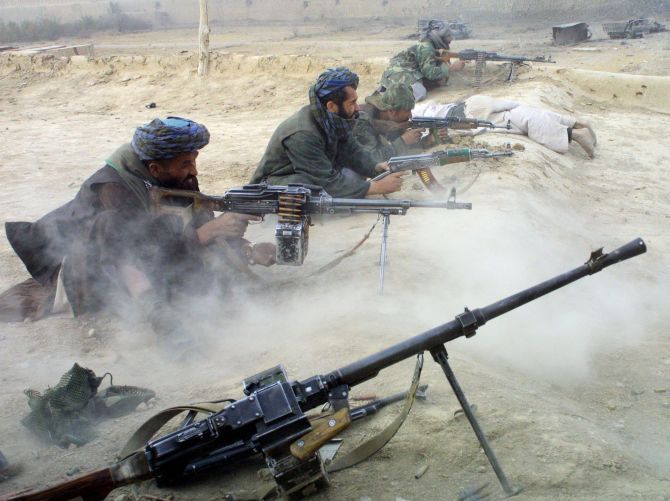
'It was a mission undertaken in darkness in every sense -- literally, because Afghanistan had no electricity at that time; and, metaphorically because Delhi historically dealt only with the Pashtuns of Afghanistan and the foreign ministry's vast archives had nothing to offer on the culture and politics of the northern tribes in the Hindu Kush.'
Ambassador M K Bhadrakumar, who played a stellar role in beginning India's systemic dealings in Afghanistan in 1994, reveals for the first time how he undertook that most important and risky mission.
One thing I learnt early enough in South Block was that as head of a territorial division, the success of a policy initiative almost always would lie in slipping it in innocuously when the superiors were overworked. Even if the idea were heretical, the chances of it finding habitation depended on the timing.
That was how the saga of India's systemic dealings with the Afghan Mujahideen began in 1994.
The fifteenth anniversary of the assassination of Ahmed Shah Massoud, the legendary 'Lion of Panjshir,' becomes an appropriate occasion to reminisce.
But, first, it is necessary to summon some history from the attic of the mind. Circa 1991, it wasn't particularly difficult for an Indian diplomat to bump into an odd Afghan Mujahideen representative accidentally at an embassy reception in Islamabad.
But they could never engage in a conversation, despite immense curiosity (on both sides), being acutely conscious of the prying eyes of Pakistani intelligence.
With the vague hint of a smile and a slight bow, the proud Afghan would slip away, half-apologetically, wary that even a small bite of the forbidden fruit would exile him forever from the Garden of Eden in Peshawar.
For, the endgame had already begun for the Communist regime in Kabul, and the Mujahideen knew their hour of reckoning had come, and that Pakistan's Inter-Services Intelligence could condemn them to perish or give them everlasting life.
Then, in April 1992, the Mujahideen became Fateh Kabul, overthrowing the Communist regime headed by Najibullah. Soon afterward, when I returned to Delhi to head the Iran-Pakistan-Afghanistan Division in South Block, I was confident that Foreign Secretary J N Dixit (whose deputy I had been in the mission in Islamabad) would instinctively sense the raison d'etre of the need to deal with the Mujahideen government in Kabul.
But then events overtook us as a mob ransacked our mission in Kabul and our diplomats hastily vacated to Delhi. We shut down the embassy. There was no option, but to bide time.
Then, in end-August, we received a curious query from Kabul wondering whether the aircraft carrying President Burhanuddin Rabbani and his delegation could refuel in Delhi en route to Jakarta to attend the Non-Aligned Movement summit meeting (September 1 to 6, 1992).
It took some effort to get the approval of the concerned authorities. (Dixit had already left for Jakarta.) Indeed, Indian establishment thought it was a bizarre idea to allow a planeload of 'Wahhabis' to land in Delhi as our State guests. (The mindset was not very different from what we have today vis-a-vis the Taliban.)
But, fortunately, it took a split second only for the razor-sharp mind of the then acting foreign secretary K Srinivasan to get the point, when I hardly began explaining that the Mujahideen were likely sending a complicated signal to us, reaching out to us, and bypassing their Pakistani mentors by contacting us directly.
That turned out to be a defining moment. When Dixit came to know about the Mujahideen's rites of passage through Delhi, he suggested I could draft a policy paper to approach then prime minister P V Narasimha Rao, initiating a proposal to open a line of communication with the Afghan Mujahideen.
As it turned out, the MEA was outvoted. Rao had a great quality of observing and listening and taking his own time to make up his mind. When he finally did in this case, several months had passed. Dixit had superannuated.
However, Srinivasan (who had gone to the airport to receive Rabbani over a year ago) said with a wry smile on this face, glancing at the memo from Rao's office giving approval to our proposal, that under the circumstances he could think of no one else than me to undertake the mission.
The above recap is necessary to put in perspective how I landed one midnight on the airstrip in Bagram, built by the Red Army, in pitch darkness in the winter of 1994 and got picked up by the Mujahideen belonging to the Jamiat-i-Islami.
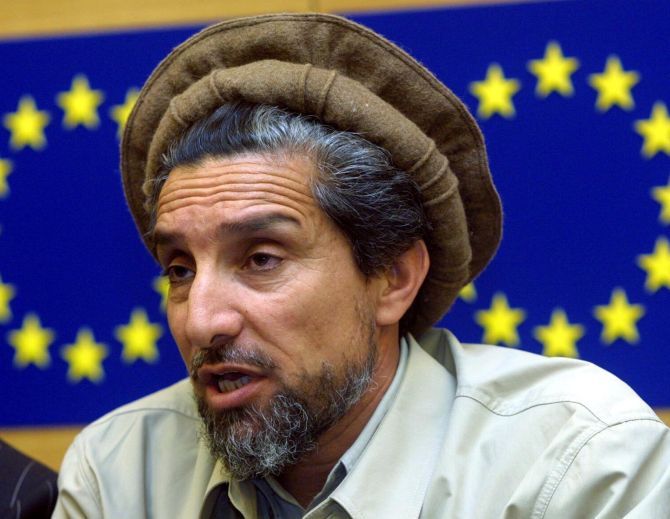
It was a mission undertaken in darkness in every sense -- literally, because Afghanistan had no electricity at that time; and, metaphorically because Delhi historically dealt only with the Pashtuns of Afghanistan and the foreign ministry's vast archives had nothing to offer on the culture and politics of the northern tribes in the Hindu Kush.
That cold winter night, a group of Jamiat fighters had come in Toyota pick-ups, armed to the teeth with Kalashnikovs and rocket launchers, and I was bundled into one of the vehicles and we quickly sped in a convoy toward Kabul.
Some fighting was going on in the vicinity of Bagram between Massoud's Jamiat and the Wahhabi group of Ittehad led by Rasul Sayyaf for control of territory sandwitched between the Panjshir Valley and the Parwan mountains.
The next day morning in the biting cold we set out for Panjshir. The road taking us out of Kabul soon descended to the Bagram Valley, an oasis crisscrossed with irrigation canals, along a vast river-cut plain, past the quaint little town of Charikar (where, by the way, Alexander the Great had set up camp in the spring of 327 BC) on the gateway to the Panjshir Valley.
The road began climbing and the mountains of the Hindu Kush, impossibly sharp and steep, sailed into view in the distance. Soon the road started running perilously close to the river Panjshir inside a ravine of rock strata faulted at absurdly acute angles. We continued through high gorges following the tumbling waters of the river upstream.
We drove along past dozens and dozens of rusted out Soviet tanks and armour and then the valley began opening out magnificently ahead of us, presenting a veritable feast to the eye and mind, stretching, I was told, all the way toward the high pastoral meadows of Wakhan corridor, eventually ending at the Chinese border.
Mud-built villages clung to the hillside, while the valley floor was full of lush green farms filled with fat-tailed sheep. We drove still more through several villages littered with rusting Soviet military hardware.
The sun was pretty blazing by the time we reached Bazarak, the town that holds Massoud's tomb today. We ate pan-fired trout straight from the river, of such delicate, nutty flavour that I have only tasted in Scotland.
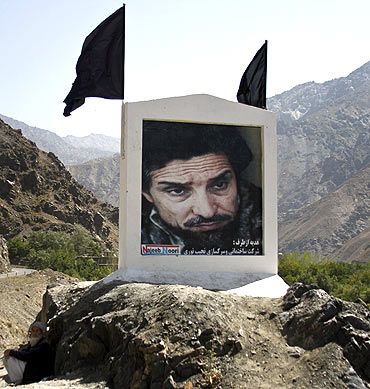
I had expected Massoud to be 'different.' Perhaps, that was because somehow I associated him with another handsome Tajik leader I got to know in 1990 in Najibullah's government -- Farid Mazdak -- who was a member of the politburo of the Afghan Communist Party but also an ardent exponent of national reconciliation with the Mujahideen.
However, I find that before retiring for the night later that evening, I had made a noting in my scrap book -- 'He resembles Bob Marley.'
Our conversation was held in two parts clocking 5 to 6 hours on successive days, interspersed with a field trip to the 'war front.'
The Jamiat was locked in mortal combat with another Mujahideen group, the Hezb-e-Islami led by Gulbuddin Hekmatyar at that time for control of Kabul and was jostling with Ittehad, the Mujahideen group led by Rasul Sayyaf, whom also, interestingly, I was to meet later during the visit. (Jalaluddin Haqqani was a commander under Sayyaf during the jihad.)
Massoud greeted me warmly by observing that I was the first Indian official he was met through the entire period of the Afghan jihad. I responded that nonetheless he was far from a stranger to us, and that we always admired him, albeit from a distance, as a robust Afghan nationalist. Massoud was visibly pleased and I felt I struck the correct chord for a transparent conversation.
Our meeting took place in a room, which would correspond to the 'map room' in South Block in the ministry of defence. My mission was deceptively simple -- convey to the leadership of various Mujahideen groups that we were not their enemies and that we hoped for cordial, friendly relations, which were after all civilizational, rooted deeply in history.
Massoud gave a lengthy statement explaining the Jamiat's ideology, couched heavily in nationalistic idiom with plentiful innuendos and loaded remarks about Pakistan's intrusive policies toward Afghanistan.
He spread out the maps and with a pointer and explained at some length the overall security situation. Of course, at that precise moment, he saw Hekmatyar as an existential threat.
They were course mates in the engineering faculty at Kabul University in the early seventies when Pakistani intelligence attracted then to the charms of political Islam and the call of jihad, but the rivalry was so intense at a personal level to lend itself to reconciliation even in their adulthood.
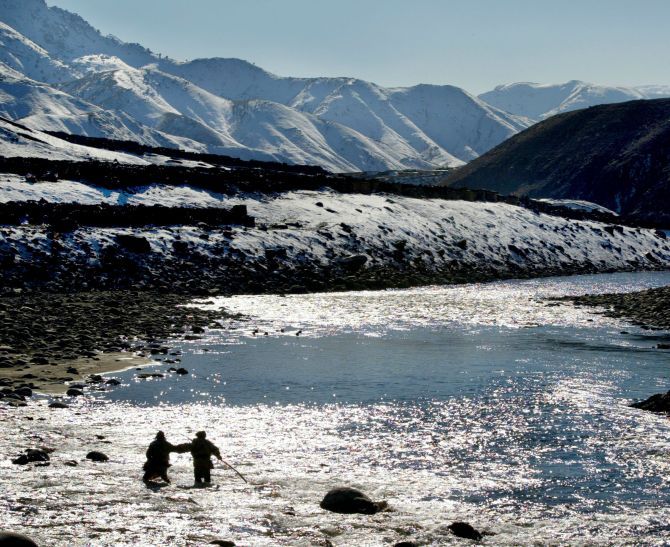
I carefully noted that Massoud was vague about the Taliban who had by then taken control of Kandahar and were moving into the western province of Herat and were eyeing the highway leading to Kabul.
One key element in my mission was to gather as much information as possible on the Taliban, a new force that had mysteriously appeared on the Afghan chessboard, ostensibly pouring out of Pakistani madrassas spontaneously fired up by a revulsion against Mujahideen misrule.
Later on, during my eight-day mission, I came to know that there were secret contacts going on between Rabbani and the Taliban emissaries, since they had a common interest to squash Hekmatyar and eject him from Afghan politics.
That was genuinely baptism under fire, as I learnt one cardinal lesson as a foreigner, namely, that in the quicksand of Afghan fratricidal strife, there were no permanent enmities.
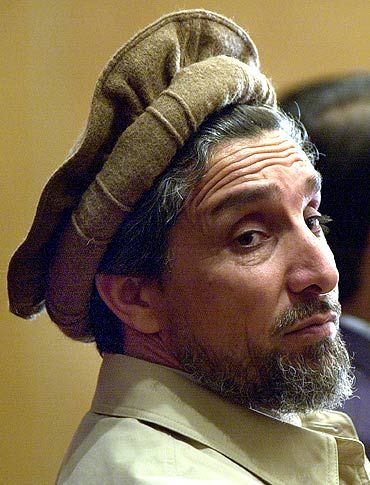
Massoud asked for India's help in the struggle to regain Afghanistan's sovereignty and territorial integrity.
I could sense that he had a good grasp of the India-Pakistan tensions at that time. (The insurgency in Jammu and Kashmir was nearing high noon by that time -- the bloody violence and mayhem in the valley, orchestrated by Pakistan, was driving Delhi to despair.)
Evidently, Massoud was hinting at the shared concerns of Kabul and Delhi in checkmating the Inter Services Intelligence. He (and Rabbani whom I met separately) harped on the importance of India reopening the mission in Kabul at the earliest. He offered full protection for our diplomats and chancery premises.
Ironically, I picked up the bazaar gossip later that 'Panjshiris' too had played their due part in the looting and ransacking of our mission, and were second to none in stealing our embassy vehicles, chandeliers and the imported furniture and Kashmiri carpets -- even embossed crockery and silver cutlery at the Residence.)
Another template of my mission was to discuss the future of Najibullah who was living in the UN compound. Prime Minister Rao wanted a request to be made on his personal behalf that Najib should be allowed to leave for India. (I was also carrying some packets -- knitted woollen sweaters, an album of photographs of the children and so on, given by Mrs Najibullah, who was living in exile in Delhi, to be handed over to her husband.)
Indeed, I had a personal interest too in making this demarche to Massoud (and to Rabbani), having had a role myself in the sordid drama in Islamabad in April 1992 when the UN special envoy Benon Sevon tried to negotiate an orderly 'transfer of power' in Kabul in April 1992 -- and failed spectacularly and became a burnt-out case, ruining a successful professional career. (That's another story for another time.)
To be sure, I made an impassioned plea to Massoud that he should let Najib leave Kabul and that I'd be privileged to escort him to Delhi. By the way, that was also the intention.
But I realised immediately that I had caught Massoud on the wrong foot. He hadn't expected the forceful demarche. Massoud, who was never lost for words, fell silent for a minute. And then he replied evasively that his fellow Mujahideen would misunderstand if he let Najib go.
Of course, that was baloney because Massoud was the king in Kabul at that time. Not a fly could move without his intelligence chief Mohammed Fahim knowing about it and reporting to the 'Commander.' (Interestingly, I was put up in a 'safe house' in Kabul next to Fahim's.)
Massoud had already got rid of Uzbek commander Rashid Dostum by then, whose defection was decisive in the ouster of Najib in April 1992. He also had slammed the door shut on Hekmatyar and 'Ustad' Sayyaf, and had even marginalised the harmless Sibgatullah Mojaddedi.
Massoud was the monarch of all he surveyed.
The Mujahideen government in late 1994 remained notionally a coalition government but was de facto a Jamiat government -- more precisely, a government dominated by Shura-i-Nazar ('Shura of the North'), which was directly under Massoud's direct command.
Years later, Massoud's key political advisor Abdul Rahman had come to Ankara in 2001 to attend the funeral of Dostum's mother. Upon hearing I was around, he dropped by at the embassy residence and during a long conversation into the night over a bottle of cognac, I broached the subject of Massoud's equation with Najib.
Abdul Rahman was Massoud's political strategist, including the negotiator of the plot that brought down Dostum's defection from Najib's government that brought the roof crashing down on the Communist regime in April 1992.
We had struck a great friendship and that was how Abdul Rahman candidly admitted that evening in Ankara how Massoud used to depute him to the UN compound to meet Najib quietly to check out the intricacies of Pashtun tribal politics.
Massoud was acutely conscious that Najib had no peers in his knowledge of the ins and outs of Pashtun tribal alignments. To cut a long story short, I never really believed Massoud's excuse for not allowing Najib to leave.
Massoud could be very charming if he wanted to. He wanted me to relay the assurance from him personally to PM Rao that as long as he was alive, he'd ensure that no harm came to Najib -- and India should trust him.
Two years later, in September 1996, in a rundown hotel in downtown Dushanbe, the Tajik capital, while taking the morning shower, I heard the 'breaking news' over the crackling short wave BBC transmission via my ancient transistor radio that Najib had been murdered.
I could feel the iron in my soul when it dawned that Massoud had retreated into the safety of the Panjshir Valley, leaving Najib behind to the mercy of the ISI.
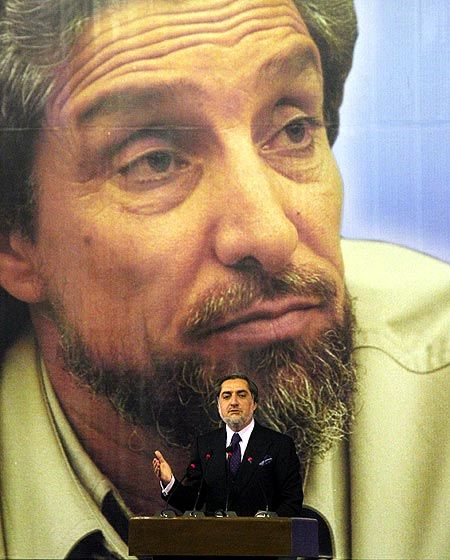
Massoud's motivations in dodging Rao's personal request continue to intrigue me. The point is, he had nothing to lose by allowing Najib to leave with me to Delhi.
Today, I try to rationalise it this way. One, the wily Tajik leader probably had calculated that he'd in a near future have uses for Najib, an Ahmedzai with vast knowledge of the eddy of Pashtun politics, while choreographing a strategy to make his next move, which was to try and get a grip on the tumultuous Pashtun belt in the southern region, which was an imperative need for him in the period ahead to consolidate his rule over Afghanistan as the undisputed 'Amir'.
Two, contrary to what many might think, Massoud was a 'secular-minded' national leader, not unlike Najib himself in many ways. Here the 'ifs' of history come into play.
To give the benefit of doubt to Massoud, he probably harboured hopes of a co-habitation with Najib somewhere in the womb of time because that extraordinary Afghan politician was a strategic asset to have by his side.
Three, most plausibly, Massoud did not want Najib to retire to the safety of Delhi from where there was always the possibility that he might stage a political comeback with India's support (just as Pakistan feared that Najib would be India's trump card if he escaped to Delhi.)
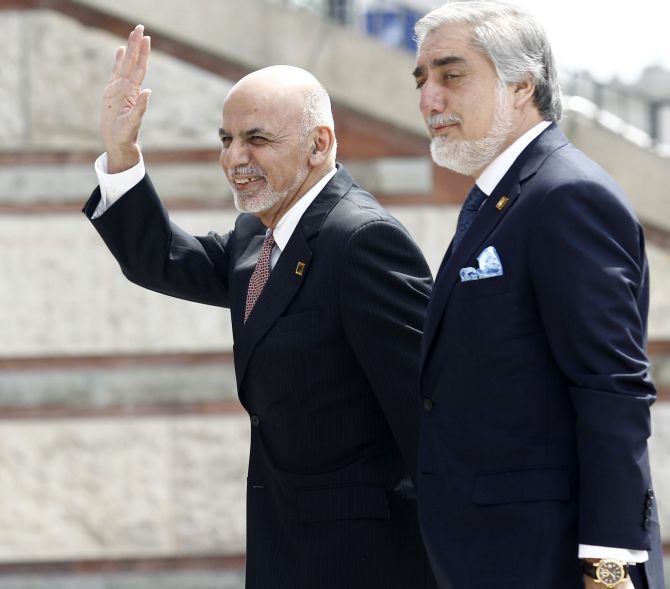
Conceivably, Massoud wanted himself to be India's principal interlocutor in the Hindu Kush. (Later on, his wish came true as our folks began eating out of his hands.)
Massoud saw India, as most Afghans do, as the benefactor whose support for him exclusively could make a big difference to the fluid intra-Afghan balance of forces involving the various groups.
No doubt, Massoud (and Pakistan too) was spot on if he actually feared that Najib was the one leader with whom India would have any day walked into the night in the Hindu Kush.
Suffice it to say, one side of Massoud's personality that remains to be 'demystified' fully is that he was a brilliant tactician. He had no fixed notions about relationships. Everything depended on the utility of a relationship.
Take the legend of the 'Lion of Panjshir'. It hinged primarily on his lionisation by the West (especially France) for the defeat he inflicted on the Red Army in Afghanistan. Massoud benefited greatly from being a darling of the West.
Indeed, it was a well-earned reputation that he inflicted major defeats on the Soviet army in Afghanistan, and that was important for the West in the Cold War era.
As I recounted earlier, the Panjshir Valley bore witness to his feats as a brilliant guerrilla commander. Hundreds of rusting pieces of weaponry abandoned by the retreating Soviet forces lay littered on the hillsides as monuments to Massoud's daring and skill as a guerrilla leader.
But, having said that, Massoud's equations with the Soviet forces in Afghanistan were far more complex than what those rusted weaponry would tell us. Contrary to the legend, the major Soviet offensives in Panjshir were actually compressed between a short period between 1982 and 1984 (with a year-long ceasefire in between too.)
Before that and after that, there had been all along a tacit understanding of 'live-and-let-live' between Massoud and Soviet intelligence.
It is useful to recollect that with Pakistani support Massoud had already ejected the Afghan army from Panjshir by 1979 -- that is, before the Soviet intervention in Afghanistan.
According to Abdul Rahman, the Soviets had cut a deal with Massoud to allow safe passage for the Red Army columns entering Afghanistan via the land route during the intervention on New Year Day in 1980, heading for Kabul through the Salang Pass.
Ironically, none other than the then chief of Afghan intelligence Najib was the go-between, but Massoud insisted that he'd prefer to deal directly with Soviet intelligence.
The more I reflect, the more I am convinced that Massoud was more of a politician and a diplomat than a military man (although his calibre as 'commander' was never in doubt.) Thus, through the second half of the 1980s, Massoud and the Soviets largely observed a delicately-worked out peaceful co-existence, with warts and all.
Indeed, General Boris Gromov, who commanded the Soviet withdrawal in 1989 later disclosed in his book Soviet Army in Afghanistan that Massoud had an agreement with GRU (Soviet army intelligence) to allow the supply convoys from the Heiraton border crossing for the troops deployed in Afghanistan to be allowed safe passage through the Salang tunnel and the Panjshir valley.
Equally, Abdul Rahman gave a highly nuanced picture of Massoud's equations with the ISI, which is different from the simplistic notions that many one-dimensional minds in the Indian establishment would have had.
By the way, during that week that I was in Kabul in 1994, Massoud had received another visitor also -- former ISI boss, General Hamid Gul.
The bottom line is that Massoud's motive in leaving Najib behind in the UN compound even as he and his militia vacated Kabul unscathed -- almost like a negotiated settlement -- will remain an Afghan puzzle.
To be sure, when I returned to Delhi after the mission to Afghanistan to establish contacts with Mujahideen groups, I recommended strongly to reopen the embassy in Kabul and to restore the friendly relations.
However, fundamentally, I recommended against the idea of India rendering military support, the overt and not-so-overt 'feelers' put out by almost all the Mujahideen leaders notwithstanding.
It simply didn't make sense why India should take sides in a civil war where the frontlines would keep shifting.
The wheel has come full circle in Afghanistan. Another uneasy coalition, increasingly lacking legitimacy, is in power in Kabul today again with the support of foreign benefactors who, again, think they are the lords of the manor, but in reality are not.
If there is any sense to the saying of the 'tail wagging the dog,' this is it.









